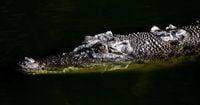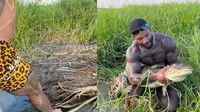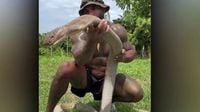Wildlife controversies are nothing new in Australia, but the latest incident involving a U.S. influencer has sparked a firestorm that’s reverberating from the outback to online comment sections. Mike Holston, known to his millions of followers as "The Real Tarzann," is now under investigation by Australian authorities after posting videos of himself wrestling both saltwater and freshwater crocodiles in Queensland. The saga has reignited debates about wildlife protection, influencer culture, and the dangers of social media stunts.
On September 11, 2025, Holston uploaded a series of Instagram videos that quickly went viral. In one, he’s seen shirtless, leaping into shallow waters near Lockhart River, Queensland, and chasing down a freshwater crocodile. The footage captures Holston wrestling the animal, which thrashes and emits distressed noises before escaping his grip. Holston emerges from the encounter with a bloody arm, exclaiming, "He got ahold of me, but I got ahold of him!" according to coverage from BBC and USA TODAY.
Another video shows Holston pursuing a young saltwater crocodile into tall grass by a riverbank. He grabs the reptile by the throat, lifts it for the camera, and holds it motionless across his leg. The crocodile, one of the world’s largest and most dangerous reptiles, appears limp—a detail that experts say could indicate dangerous levels of stress. After a few photos and close looks, Holston releases the animals back into the wild, as he later claimed in replies to social media comments.
The videos, which Holston insists are "educational," have amassed millions of views but also drawn a tidal wave of criticism. Many online commentators accused the influencer of cruelty and disrespect. "This is not courage, it’s ego disguised as bravery. A crocodile is not an object for entertainment, but a living being that carries millions of years of evolution within it. To stress and endanger such a creature for the sake of human vanity is not education—it’s exploitation," read one comment highlighted by USA TODAY. Others were more succinct: "So unnecessary and disrespectful. I had you and your intentions towards living creatures all wrong. Time to unfollow."
Holston, for his part, defended his actions, stating that the crocodiles were "released after a few close looks and photos were taken" and insisting he did not encourage anyone to try to recreate the videos. He did not respond to direct requests for comment from several media outlets, including USA TODAY and Gizmodo.
The Queensland Department of Environment, Science and Innovation (DESI) wasted no time in responding. Officials confirmed on September 11 that they had launched an active investigation into Holston’s actions, which they described as "extremely dangerous and illegal." In a statement to multiple outlets, DESI warned, "Let us be clear: people should not attempt to capture freshwater or saltwater crocodiles in Queensland, unless they are trained and licensed to do so." The department said it was "actively exploring strong compliance action, including fines to deter any person from this type of behaviour."
The penalties for such offenses in Queensland are severe. Fines for interfering with saltwater crocodiles can reach up to 27,539 AUD (about 18,400 USD), with on-the-spot fines for merely remaining in close proximity to a crocodile on land starting at 806 AUD (around 636 USD) and escalating to 16,690 AUD (about 11,000 USD). In some cases, fines can climb as high as 37,500 AUD (roughly 24,776 USD), according to the BBC. These regulations are part of a broader effort to protect Australia’s unique and often dangerous wildlife from human interference, especially as social media stunts become more common.
Queensland’s Premier David Crisafulli weighed in, bluntly calling Holston a "goose" and echoing the sentiment that such behavior is not only illegal but also puts both people and animals at risk. The state has introduced new legislation in recent years to crack down on dangerous interactions with crocodiles, including making it an offense to unintentionally feed the reptiles by dumping food in public spaces.
Perhaps the most pointed criticism came from Bob Irwin, the father of the late Steve Irwin—the famed "Crocodile Hunter" known for his conservation work and respectful approach to wildlife. In comments reported by news.com.au and the Brisbane Times, Irwin said, "People visiting our country need to respect our wildlife, or they need to be booted out the door." He dismissed any comparison between Holston and his son, stating, "You can’t even put them in the same sentence. Everything Steve did … was to respect wildlife." Irwin further explained, "Anyone who actually knows how to handle crocodiles knows they don't respond well to capture. It's a specialised skill to do it without causing dangerous stress and lactic acid build-up—and this bloke clearly had no clue." He called for greater penalties for such behavior, arguing that current fines are "laughable" compared to the money influencers can make online.
Wildlife experts echoed Irwin’s concerns, noting that the subdued behavior of the saltwater crocodile in Holston’s video was unusual and likely a sign of severe distress. The Queensland environment department spokesperson told ABC Australia, "It is a significant offence to interfere with freshwater crocodiles in Queensland, not to mention extremely dangerous."
Australia’s crocodile population is nothing to take lightly. Government figures estimate there are between 20,000 and 30,000 saltwater crocodiles in Queensland’s "Croc Country." These creatures can grow up to 13 feet long, with males weighing over 600 pounds. Between December 1985 and April 2024, there were 34 non-fatal and 14 fatal saltwater crocodile attacks in Queensland, according to official records. Recent incidents include the discovery of human remains inside a large crocodile in August 2024 and a 12-year-old girl being snatched by a crocodile while swimming in July 2024.
The controversy surrounding Holston’s videos is not an isolated event. Just a few months prior, another U.S. influencer faced backlash after filming herself taking a baby wombat from the side of a road, laughing as she ran from the distraught mother. That incident prompted even Prime Minister Anthony Albanese to comment, suggesting the woman try the same with animals "that can actually fight back." The growing number of such episodes has led Australian officials and conservationists to plead with tourists and content creators: stop interfering with the wildlife.
As the investigation into Holston’s actions continues, the case has become a flashpoint in the broader conversation about social media’s impact on wildlife and the responsibilities that come with a global platform. Whether the influencer will face the maximum fines or further legal consequences remains to be seen, but the message from Australia’s leaders and experts is clear: respect the wildlife—or risk being “booted out the door.”
In the end, the uproar serves as a stark reminder that the allure of viral fame should never come at the expense of vulnerable creatures—or the laws designed to protect them.



